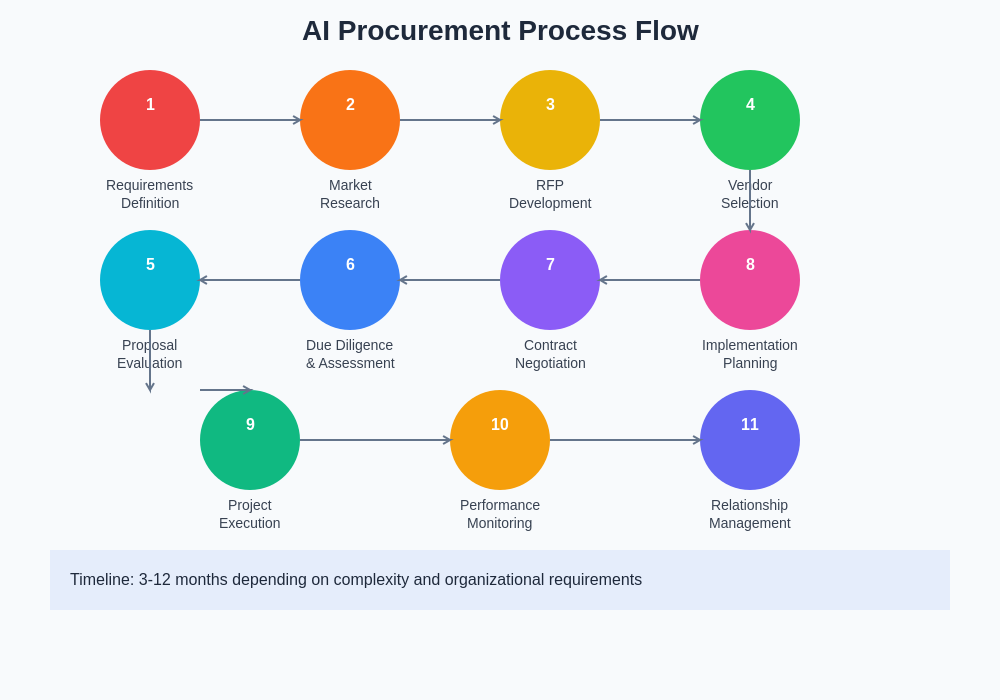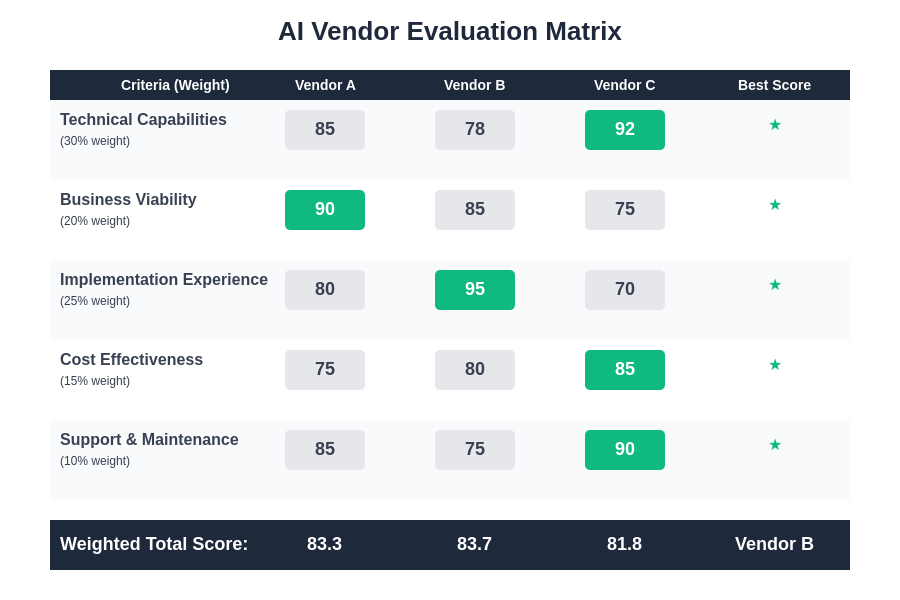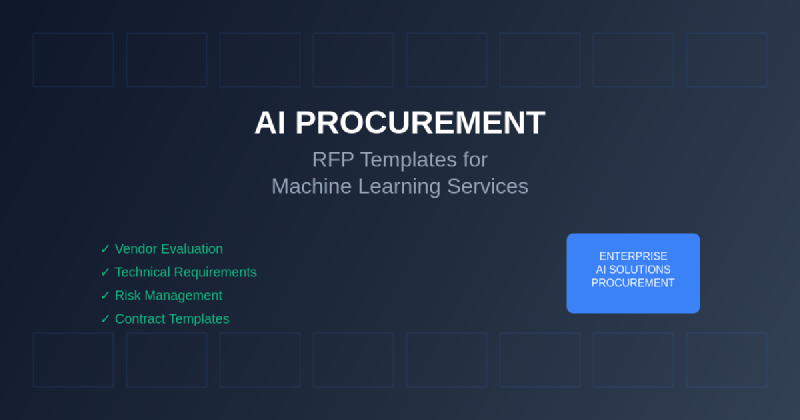The procurement of artificial intelligence and machine learning services represents one of the most critical strategic decisions facing modern enterprises as they navigate the complex landscape of digital transformation. The process of selecting the right AI vendor requires sophisticated evaluation frameworks, comprehensive request for proposal templates, and deep understanding of both technical capabilities and business implications that extend far beyond traditional technology procurement practices.
Explore the latest AI procurement trends and strategies to understand how leading organizations are successfully implementing AI solutions through strategic vendor partnerships. The complexity of AI procurement demands a structured approach that balances technical excellence with practical business considerations, ensuring that organizations make informed decisions that drive long-term value and competitive advantage.
Understanding the AI Procurement Landscape
The artificial intelligence procurement landscape differs fundamentally from traditional software acquisition processes due to the inherent complexity of machine learning systems, the evolving nature of AI capabilities, and the strategic importance of data privacy and algorithmic transparency in enterprise environments. Organizations must navigate a multifaceted ecosystem that includes specialized AI vendors, established technology companies expanding into AI services, cloud platform providers offering AI-as-a-Service solutions, and emerging startups developing cutting-edge machine learning technologies.
The procurement process requires careful consideration of technical architecture requirements, data governance frameworks, regulatory compliance obligations, and integration capabilities with existing enterprise systems. Successful AI procurement initiatives recognize that the selection of AI vendors represents not merely a technology purchase but a strategic partnership that will influence organizational capabilities, competitive positioning, and future innovation potential across multiple business functions and operational processes.
Essential Components of AI RFP Templates
A comprehensive AI RFP template must address the unique characteristics of machine learning services while providing vendors with clear guidance on evaluation criteria, technical requirements, and business objectives. The template should begin with a detailed organizational profile that outlines current technology infrastructure, data assets, existing AI initiatives, and strategic objectives for AI implementation across various business units and operational domains.
The technical requirements section must specify data handling capabilities, algorithm transparency requirements, model performance expectations, scalability parameters, integration specifications, and security protocols that align with enterprise standards and regulatory compliance obligations. Vendors need comprehensive understanding of the organization’s data architecture, existing analytics platforms, cloud infrastructure preferences, and performance benchmarks that will be used to evaluate proposed solutions and ongoing service delivery.
Leverage advanced AI platforms like Claude to enhance your procurement evaluation process with sophisticated analysis of vendor proposals and technical documentation review. The integration of AI tools in the procurement process itself demonstrates organizational commitment to leveraging artificial intelligence across all business functions while providing practical experience with AI capabilities and limitations.
Vendor Evaluation Frameworks and Criteria
The evaluation of AI vendors requires multidimensional assessment frameworks that examine technical capabilities, business viability, cultural alignment, and long-term strategic fit with organizational objectives and values. Technical evaluation criteria must include algorithm performance metrics, data processing capabilities, model interpretability features, scalability architecture, security implementations, and integration complexity with existing enterprise systems and workflows.
Business evaluation dimensions encompass vendor financial stability, implementation track record, industry expertise, support infrastructure, pricing transparency, contract flexibility, and demonstrated ability to deliver successful AI implementations in similar organizational contexts. The evaluation framework should also assess vendor commitment to ethical AI practices, algorithmic fairness, bias mitigation strategies, and transparency in model development and deployment processes.
Cultural alignment factors include vendor responsiveness to organizational requirements, willingness to customize solutions, communication effectiveness, collaboration approach, and demonstrated understanding of industry-specific challenges and regulatory constraints. Long-term strategic considerations involve vendor innovation roadmap, research and development investments, partnership ecosystem, and ability to evolve solutions as organizational AI maturity and requirements advance over time.
Technical Requirements Specification
The technical requirements section of AI RFPs must provide detailed specifications for machine learning capabilities, data processing requirements, performance benchmarks, and integration parameters that enable vendors to propose appropriate solutions and implementation approaches. Data requirements should specify volume expectations, data types and formats, real-time processing needs, historical data analysis capabilities, and data quality requirements that impact algorithm performance and accuracy.
Algorithm specifications must address model types preferred or required, performance accuracy thresholds, training data requirements, model updating frequencies, interpretability needs, and bias detection and mitigation capabilities. Infrastructure requirements include cloud platform preferences, on-premises deployment options, scalability parameters, security protocols, disaster recovery provisions, and integration specifications with existing enterprise applications and data systems.
Performance benchmarks should establish clear metrics for algorithm accuracy, processing speed, system availability, response times, and scalability parameters that will be used to evaluate vendor capabilities and ongoing service delivery. Security requirements must address data encryption standards, access control mechanisms, audit logging capabilities, compliance certifications, and privacy protection measures that align with organizational security policies and regulatory obligations.
Data Governance and Privacy Considerations
Data governance represents a critical component of AI procurement that requires careful specification of data handling procedures, privacy protection measures, regulatory compliance obligations, and intellectual property considerations that govern the use of organizational data in machine learning applications. The RFP must clearly define data ownership rights, usage restrictions, retention policies, deletion procedures, and cross-border data transfer limitations that vendors must acknowledge and comply with throughout the engagement.
Privacy protection requirements should specify encryption standards, anonymization techniques, access control mechanisms, audit trail capabilities, and incident response procedures for potential data breaches or unauthorized access events. Regulatory compliance obligations must address industry-specific requirements such as GDPR, HIPAA, SOX, or other relevant regulations that impact data handling and algorithmic decision-making processes within the organizational context.
Intellectual property considerations include ownership of derived insights, model improvements, algorithm enhancements, and data processing methodologies developed during the engagement. The procurement process must establish clear frameworks for protecting organizational data while enabling vendors to deliver effective AI solutions that meet performance and functionality requirements without compromising data security or regulatory compliance.

The AI procurement process requires systematic progression through multiple evaluation phases, each with specific deliverables and decision points that ensure comprehensive vendor assessment and risk mitigation. This structured approach enables organizations to make informed decisions while maintaining focus on strategic objectives and operational requirements. The eleven-phase methodology provides comprehensive coverage of all critical procurement activities from initial requirements definition through ongoing relationship management and performance optimization.
Contract Structure and Risk Management
AI service contracts require sophisticated risk management frameworks that address the unique challenges associated with machine learning implementations, including algorithm performance variability, data quality dependencies, model drift over time, and evolving regulatory requirements that may impact service delivery and compliance obligations. Contract structures must include specific performance guarantees, service level agreements, liability allocations, and termination procedures that protect organizational interests while enabling vendor success.
Performance guarantees should specify algorithm accuracy thresholds, system availability requirements, response time commitments, and scalability parameters with clear consequences for non-performance and remediation procedures for addressing service deficiencies. Service level agreements must address model training schedules, algorithm updates, technical support availability, incident response times, and reporting requirements that ensure transparency and accountability in service delivery.
Risk allocation provisions should address liability for algorithmic bias, data breaches, regulatory compliance failures, and intellectual property infringement claims while establishing insurance requirements and indemnification procedures that provide appropriate protection for both parties. Termination procedures must include data return requirements, knowledge transfer obligations, transition assistance provisions, and intellectual property disposition that enable organizational continuity in the event of vendor relationship changes.
Enhance your procurement research with Perplexity to gather comprehensive vendor intelligence, market analysis, and competitive benchmarking information that informs strategic procurement decisions. The integration of advanced research capabilities ensures that procurement teams have access to current market intelligence and vendor performance data throughout the evaluation process.
Implementation Planning and Success Metrics
Successful AI procurement requires comprehensive implementation planning that addresses technical integration requirements, organizational change management needs, training requirements, and success measurement frameworks that enable effective project execution and value realization. Implementation planning must include detailed project timelines, resource requirements, milestone definitions, and risk mitigation strategies that ensure successful deployment and adoption of AI capabilities.
Technical integration planning should address system architecture requirements, data pipeline development, API integration specifications, testing procedures, and production deployment strategies that minimize disruption to existing operations while enabling effective AI capability delivery. Organizational change management considerations include stakeholder communication plans, training program development, workflow adaptation requirements, and performance measurement systems that support successful AI adoption.
Success metrics must include both technical performance indicators and business value measurements that demonstrate return on investment and strategic objective achievement. Technical metrics should address algorithm accuracy, system performance, user adoption rates, and operational efficiency improvements while business metrics focus on revenue impact, cost reduction, customer satisfaction improvements, and competitive advantage realization through AI implementation.
Vendor Management and Relationship Governance
Long-term success in AI procurement requires sophisticated vendor management frameworks that maintain productive relationships while ensuring continuous improvement, innovation advancement, and strategic alignment with evolving organizational objectives and market conditions. Vendor management should include regular performance reviews, relationship health assessments, innovation discussions, and strategic planning sessions that optimize value delivery and identify opportunities for enhanced collaboration.
Performance management processes must include regular algorithm performance monitoring, service delivery assessments, customer satisfaction measurements, and improvement opportunity identification that ensures vendors maintain high service standards while continuously enhancing their capabilities and offerings. Innovation management involves collaborative research initiatives, technology roadmap discussions, emerging capability evaluations, and strategic partnership development that leverage vendor expertise for competitive advantage.
Relationship governance frameworks should establish clear communication protocols, escalation procedures, decision-making authorities, and conflict resolution mechanisms that maintain productive partnerships while protecting organizational interests and ensuring accountability for service delivery and performance commitments. Strategic alignment processes involve regular business objective reviews, market condition assessments, technology evolution discussions, and partnership strategy refinements that ensure AI investments continue to support organizational goals and competitive positioning.

The systematic evaluation of AI vendors requires comprehensive assessment across multiple dimensions, with weighted scoring that reflects organizational priorities and strategic objectives. This matrix approach ensures objective vendor comparison while maintaining focus on factors most critical to long-term success and value realization. The weighted scoring methodology enables organizations to prioritize evaluation criteria based on specific business requirements while maintaining consistent assessment standards across all potential vendors.
Regulatory Compliance and Ethical Considerations
AI procurement must address increasingly complex regulatory environments and ethical considerations that impact algorithm development, deployment, and ongoing operation in enterprise environments. Regulatory compliance requirements vary significantly across industries and jurisdictions but commonly include data protection regulations, algorithmic transparency mandates, bias prevention requirements, and audit trail obligations that vendors must demonstrate capability to address through their service offerings.
Ethical AI considerations encompass algorithmic fairness, bias detection and mitigation, transparency in decision-making processes, accountability for automated decisions, and respect for human autonomy in AI-augmented processes. Procurement processes must evaluate vendor commitment to ethical AI principles, bias testing methodologies, fairness measurement capabilities, and transparent reporting of algorithm limitations and potential impacts on different population groups.
Compliance management frameworks should include regular algorithm auditing, bias testing procedures, performance monitoring systems, and documentation requirements that demonstrate ongoing adherence to regulatory requirements and ethical standards. Vendor selection criteria must include demonstrated experience with regulatory compliance, ethical AI implementation, and ability to adapt to evolving legal and ethical requirements in the AI landscape.
Cost Management and Value Optimization
AI procurement requires sophisticated cost management approaches that address both direct service costs and indirect implementation expenses while optimizing value realization through strategic vendor partnerships and efficient resource utilization. Cost modeling must include initial implementation expenses, ongoing service fees, infrastructure requirements, training costs, and long-term maintenance obligations that provide comprehensive understanding of total cost of ownership.
Value optimization strategies should focus on measurable business outcomes, operational efficiency improvements, competitive advantage realization, and strategic capability development that justify AI investments and demonstrate return on investment through quantifiable metrics and business impact assessments. Pricing models must be evaluated for alignment with organizational usage patterns, scalability requirements, and budget constraints while ensuring cost predictability and flexibility for changing business requirements.
Cost management processes should include regular spend analysis, value assessment reviews, optimization opportunity identification, and vendor performance evaluation that ensures continued cost effectiveness and value delivery throughout the engagement lifecycle. Budget planning considerations must address potential cost variations due to data volume changes, model complexity evolution, and performance requirement adjustments that may impact service pricing and resource requirements.
Future-Proofing AI Procurement Strategies
The rapidly evolving AI landscape requires procurement strategies that anticipate technological advancement, market evolution, and changing organizational requirements while maintaining flexibility to adapt vendor relationships and service offerings as conditions change. Future-proofing strategies must consider emerging AI technologies, evolving regulatory environments, changing competitive landscapes, and advancing organizational AI maturity that will influence long-term vendor relationship success.
Technology evolution planning should address algorithm advancement trends, computing infrastructure developments, data processing innovations, and integration capability improvements that may impact vendor selection criteria and service requirements over time. Market evolution considerations include vendor consolidation trends, new market entrants, changing competitive dynamics, and pricing model evolution that will influence vendor relationship strategies and procurement approaches.
Organizational maturity development involves AI capability advancement, internal expertise growth, strategic objective evolution, and operational requirement changes that will influence vendor partnership needs and service delivery expectations as organizations become more sophisticated in their AI utilization and strategic implementation of artificial intelligence capabilities across business functions.
The strategic importance of AI procurement extends beyond immediate technology acquisition to encompass long-term competitive positioning, innovation capability development, and organizational transformation that will define success in an increasingly AI-driven business environment. Organizations that approach AI procurement with comprehensive frameworks, sophisticated evaluation criteria, and strategic partnership perspectives position themselves for sustained success and competitive advantage in the digital economy.
Disclaimer
This article provides general guidance on AI procurement and RFP development and does not constitute legal, financial, or professional advice. Organizations should consult with qualified legal counsel, procurement specialists, and industry experts when developing AI procurement strategies and vendor selection processes. Regulatory requirements, industry standards, and best practices may vary by jurisdiction and sector, requiring customized approaches to AI procurement and vendor management.
